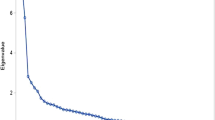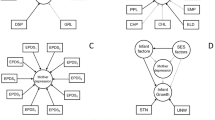Abstract
Objective:
The objective of this study was to analyze whether maternal negative affectivity assessed in pregnancy is related with subsequent infant food choices.
Design:
The study design was a cohort study.
Subjects:
The subjects were mothers (N=37 919) and their infants participating in the Norwegian Mother and Child Cohort Study conducted by the Norwegian Institute of Public Health.
Measurements:
Maternal negative affectivity assessed prepartum (Hopkins Symptom Checklist 5 (SCL-5) at weeks 17 and 30 of pregnancy), introduction of solid foods by month 3 and feeding of sweet drinks by month 6 (by the reports of the mothers) were analyzed.
Results:
Mothers with higher negative affectivity were 64% more likely (95% confidence interval 1.5–1.8) to feed sweet drinks by month 6, and 79% more likely (95% confidence interval 1.6–2.0) to introduce solid foods by month 3. These odds decreased to 41 and 30%, respectively, after adjusting for mother's age, body mass index (BMI) and education.
Conclusion:
The maternal trait of negative affectivity is an independent predictor of infant feeding practices that may be related with childhood weight gain, overweight and obesity.
This is a preview of subscription content, access via your institution
Access options
Subscribe to this journal
Receive 12 print issues and online access
$259.00 per year
only $21.58 per issue
Buy this article
- Purchase on Springer Link
- Instant access to full article PDF
Prices may be subject to local taxes which are calculated during checkout
Similar content being viewed by others
References
Ogden CL, Carroll MD, McDowell MA, Flegal KM . High body mass index for age among US children and adolescents, 2003–2006. JAMA 2008; 299: 2401–2405.
Juliusson PB, Roelants M, Eide GE, Hauspie R, Waaler PE, Bjerknes R . Overweight and obesity in Norwegian children: secular trends in weight-for-height and skinfolds. Acta Paediatr 2007; 6: 1333–1337.
Hampson SE, Goldberg LR, Vogt TM, Dubanoski JP . Forty years on: teachers’ assessments of children's personality traits predict self-reported health behaviors and outcomes at midlife. Health Psychol 2006; 25: 57–64.
Sullivan S, Cloninger CR, Przybeck TR, Klein S . Personality characteristics in obesity and relationship with successful weight loss. Int J Obesity 2007; 31: 669–674.
Watson D, Walker LM . The long-term stability and predictive validity of trait measures of affect. J Pers Soc Psychol 1996; 70: 567–577.
Watson D, Clark LA . Negative affectivity: the disposition to experience aversive emotional states. Psychol Bull 1984; 96: 465–490.
Clark LA, Watson D . Temperament: an organizing paradigm for trait psychology. In: John OP, Robins RW, Pervin LA (eds). Handbook of Personality Theory and Research. 3rd edn. Guilford Press: New York, 2008, pp 265–286.
Costa PT, McCrae RR . Neuroticism, somatic complaints, and disease: is the bark worse than the bite? J Pers 1987; 55: 299–316.
Watson DJ, Pennebaker JW . Health complaints, stress, and distress: exploring the central role of negative affectivity. Psychol Rev 1989; 96: 234–254.
Vollrath M, Torgersen S, Alnæs R . Neuroticism, coping and change in MCMI-II clinical syndromes: test of a mediator model. Scand J Psychol 1998; 39: 15–24.
Vollrath M . Personality and stress. Scand J Psychol 2001; 42: 335–347.
Cooper PJ, Murray L, Stein A . Psychosocial factors associated with early termination of breast feeding. J Psychosom Res 1993; 37: 171–176.
Wagner CL, Wagner MT, Ebeling M, Chatman KG, Cohen M, Hulsey TC . The role of personality and other factors in a mother's decision to initiate breastfeeding. J Hum Lact 2006; 22: 16–26.
Wagner CL, Wagner MT . The breast or the bottle? Determinants of infant feeding behaviors. Clin Perinatal 1999; 26: 505–525.
Magnus P, Irgens LM, Haug K, Nystad W, Skjærven R, Stoltenberg C . Cohort profile: the Norwegian Mother and Child Cohort study. Int J Epidemiol 2006; 35: 1146–1150.
Ystrom E, Niegel S, Knut-Inge K, Vollrath ME . The impact of maternal negative affectivity and general self-efficacy on breastfeeding: the Norwegian Mother and Child Cohort study. J Pediatr 2008; 152: 68–78.
Ystrom E, Niegel S, Vollrath ME . The impact of maternal negative affectivity on dietary patterns of 18-month-old children in the Norwegian Mother and Child Cohort study. Matern Child Nutr 2009; 5: 234–242.
Kumanyika SK . Environmental influences on childhood obesity: ethnic and cultural influences in context. Physiol Behav 2008; 94: 61–70.
Glinsmann WH, Bartholmey SJ, Coletta F . Dietary guidelines for infants: a timely reminder. Nutr Rev 1996; 54: 50–57.
Kramer MS, Kakuma R . The Optimal Duration of Exclusive Breastfeeding. A Systematic Review 2002. World Health Organization: Geneva.
UNICEF. http://www.unicef.org/nutrition/index_24811.html (accessed 24 April 2008).
Grummer-Strawn LM, Scanlon KS, Fein SB . Infant feeding and feeding transitions during the first year of life. Pediatrics 2008; 22: S36–S42.
Jingxiong J, Rosenqvist U, Huishan W, Koletzko B, Guangli L, Jing H et al. Relationship of parental characteristics and feeding practices to overweight in infants and young children in Beijing, China. Public Health Nutr 2009; 12: 973–979.
Kim J, Peterson KE . Association of infant child care with infant feeding practices and weight gain among US infants. Arch Pediat Adol Med 2008; 162: 627–633.
Archer ZA, Corneloup J, Rayner DV, Barrett P, Moar KM, Mercer JG . Solid and liquid obesogenic diets induce obesity and counter-regulatory changes in hypothalamic gene expression in juvenile Sprague-Dawley rats. J Nutr 2007; 137: 1483–1490.
Mourao DM, Bressan J, Campbell WW, Mattes RD . Effects of food form on appetite and energy intake in lean and obese young adults. Int J Obesity 2007; 31: 1688–1695.
Pereira MA . The possible role of sugar-sweetened beverages in obesity etiology: a review of the evidence. Int J Obesity 2006; 30: S28–S36.
Irgens LM . The Medical Birth Registry of Norway. Epidemiological research and surveillance throughout 30 years. Acta Obstet Gynecol Scand 2000; 79: 435–439.
Strand BH, Dalgard OS, Tambs K, Rognerud M . Measuring the mental health status of the Norwegian population: a comparison of the instruments SCL-25, SCL-10, SCL-5 and MHI-5 (SF-36). Nord J Psychiat 2003; 57: 113–118.
Tambs K, Moum T . How well can a few questionnaire items indicate anxiety and depression? Acta Psychiatr Scand 1993; 87: 364–367.
Schafer JL, Graham JW . Missing data: our view of the state of the art. Psychol Methods 2002; 7: 147–177.
Haberman SJ . The analysis of residuals in cross-classified tables. Biometrics 1973; 29: 205–220.
Niegel S, Ystrom E, Hagtvet KA, Vollrath ME . Difficult temperament, breastfeeding, and their mutual prospective effects: the Norwegian Mother and Child Cohort study. J Dev Behav Pediatr 2008; 29: 458–462.
Chamorro-Premuzic T, Furnham A . Personality predicts academic performance: evidence from two longitudinal university samples. J Res Pers 2003; 37: 319–338.
Furnham A, Mitchell J . Personality, needs, social skills and academic achievement: a longitudinal study. Pers Indiv Differ 1991; 12: 1067–1073.
Komarraju M, Kauro SJ, Schmeck RR . Role of the big five personality traits in predicting college students’ academic motivation and achievement. Learn Individ Differ 2009; 19: 47–52.
Skinner JD, Ziegler P, Ponza M . Transitions in infants’ and toddlers’ beverage patterns. J Am Diet Assoc 2004; 104: s45–s50.
Warner ML, Harley K, Bradman A, Vargas G, Eskanazi B . Soda consumption and overweight status of 20-year-old Mexican American children in California. Obesity 2006; 14: 1966–1974.
Welch KR, Ariza JA, Wieczorek JL, Binns HJ . Characteristics of obese children aged 1–4 years at a referral clinic. J Natl Med Asssoc 2008; 100: 884–891.
Acknowledgements
The Norwegian Mother and Child Cohort Study is supported by the Norwegian Ministry of Health, NIH/NIEHS (Grant no. N01-ES-85433), NIH/NINDS (Grant no.1 UO1 NS 047537-01) and the Norwegian Research Council/FUGE (Grant no. 151918/S10). The contribution of Sarah E Hampson in the preparation of this article was partially supported by the Grant number AG20048 from the National Institute on Aging, USA.
Author information
Authors and Affiliations
Corresponding author
Rights and permissions
About this article
Cite this article
Hampson, S., Tonstad, S., Irgens, L. et al. Mothers’ negative affectivity during pregnancy and food choices for their infants. Int J Obes 34, 327–331 (2010). https://doi.org/10.1038/ijo.2009.230
Received:
Revised:
Accepted:
Published:
Issue Date:
DOI: https://doi.org/10.1038/ijo.2009.230



